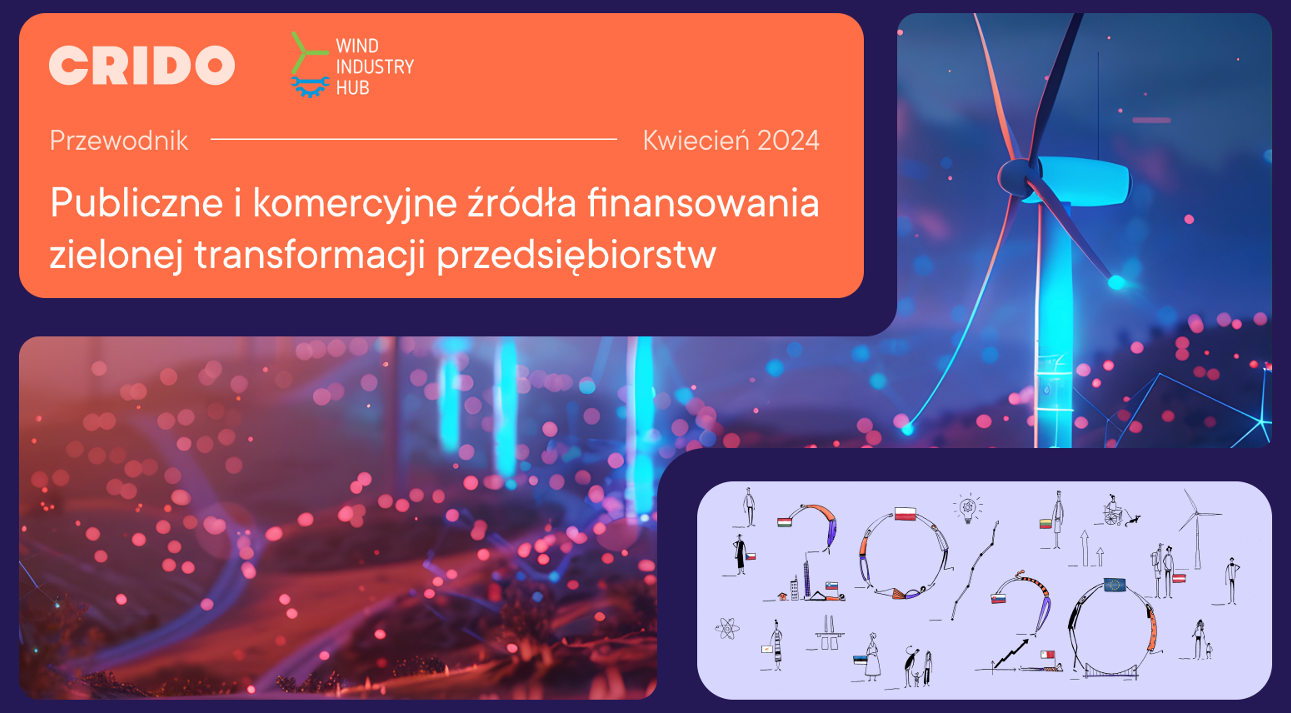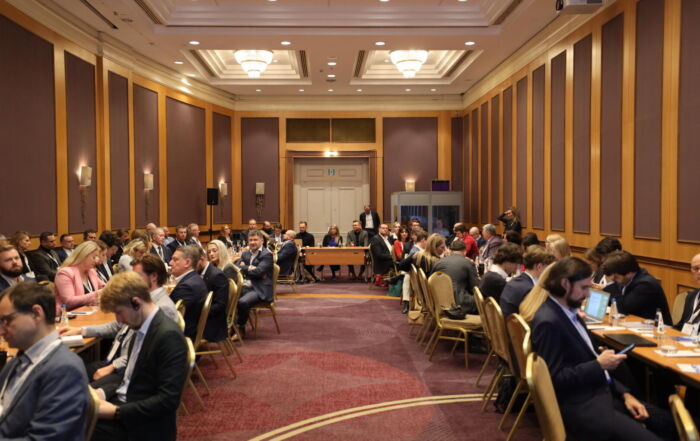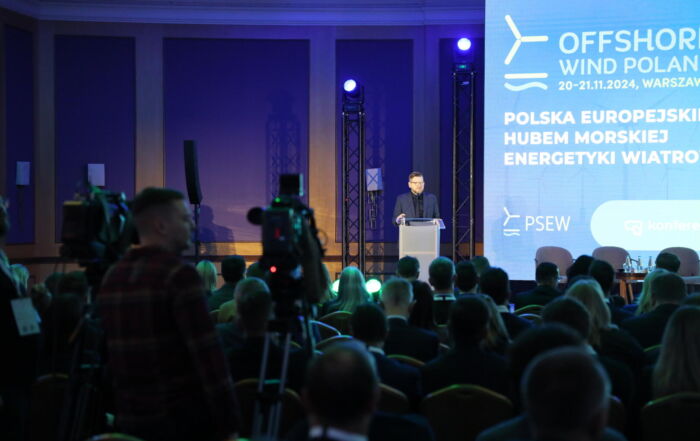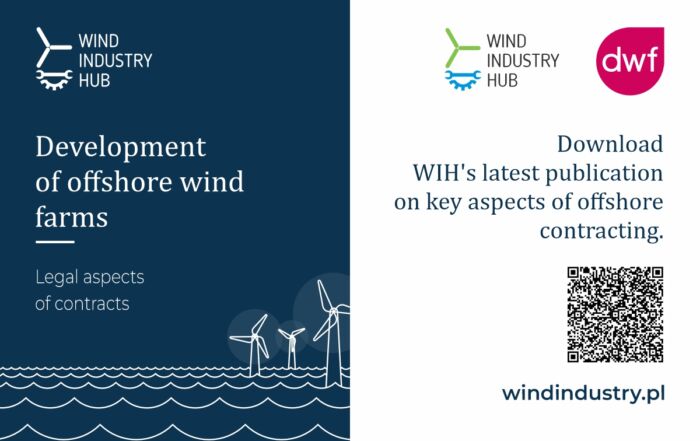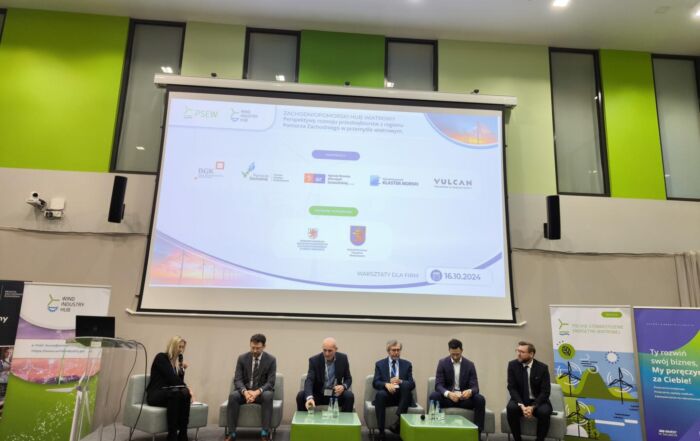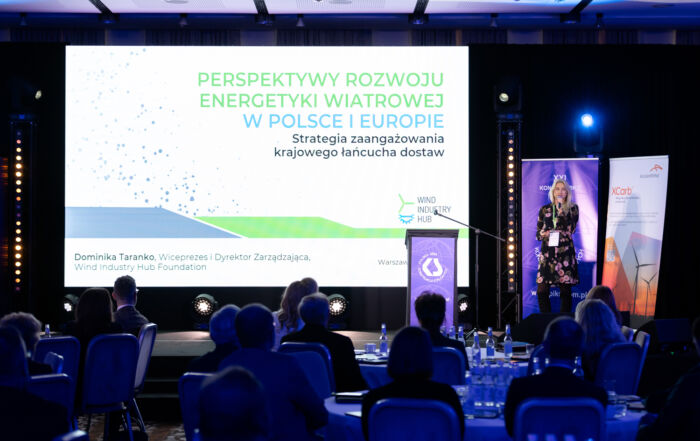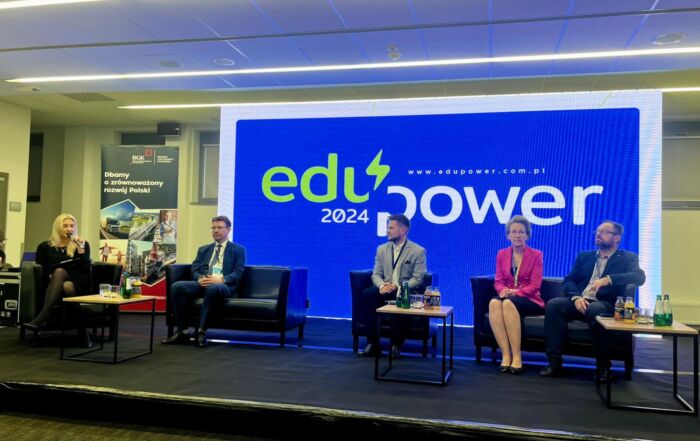“Public and Commercial Sources of Financing for Green Business Transformation” – is the title of the latest expert guide, which was launched at a joint conference of CRIDO and the Wind Industry Hub Foundation. Entrepreneurs will find in the guide a structured knowledge of, for example, regional operational programs, the amounts available in the Fair Transformation Fund, or how to raise funds for industrial decarbonization.
There is indeed a lot of work to be done in the field of energy transition, and the whole process will require high investment. This is due to the fact that the Polish energy system is mostly based on fossil fuels (last year, more than 60 percent of the electricity generated came from coal). And by 2040 alone, the document “Poland’s Energy Policy” (currently being updated) assumes energy transition expenditures at a gigantic level of PLN 1.6 trillion (about PLN 900 billion applies to the entire fuel and energy sector, while about PLN 745 billion applies to sectors such as industry, households, services, transportation and agriculture).
– The energy transition is one of the most important challenges currently facing the European Union and its member states. In our guide, we present the EU’s plan for the green transition, its essence, assumptions and implications for business,” says Magdalena Zawadzka, a partner in the Grants and Tax Credits team at CRIDO. We discuss in detail the possibilities for financing this transformation based on money distributed at the national level and from the European Commission. We also provide a breakdown in terms of specific projects for which public funds can be obtained, and point out what should be changed to make public assistance more responsive to the needs of the sector.
– Creating a new, sustainable branch of the economy from scratch – such as renewable energy – is a necessary boost for domestic industry and services. According to European, as well as Polish, strategic and planning documents, wind energy is expected to significantly increase its share in the energy mix in the coming decades, points out Dominika Taranko, Managing director and Vice President of Wind Industry Hub. – Many times, as managers in companies, we don’t know where to look for proven information about financing instruments available on the market. Therefore, I am extremely pleased that the CRIDO team, drawing on its many years of experience, is meeting the expectations of entrepreneurs by presenting a clear and concise study on the subject,” Taranko added.
However, against the backdrop of global efforts (China, the US) and the steps taken by many EU member states towards energy transition, Poland presents a weaker performance. The government prefers a model with higher financial requirements for beneficiaries, as can be seen in the support program for strategic investment projects awaiting EC notification, where only investments worth more than €110 million can qualify. Despite the subsidized nature of the instrument, the question arises as to how many entities in Poland are planning such large investments in the near future. No other member country has imposed thresholds even close to ours in their programs. Due to the limits not adjusted to the realities of the Polish economy, the issue of full utilization of the budget earmarked for this purpose – about PLN 5 billion should be allocated to entrepreneurs by the end of 2025 – is also in question.
Poland is also failing to take steps related to the creation of other dedicated programs for the green transition. This would be possible by using the assistance mechanisms of the Temporary Crisis Framework to accelerate the introduction of renewable energy and energy storage, or to decarbonize industry.
On the Reconstruction and Resilience Facility, too, optimism is hard to come by. On the one hand, we are struggling with delays in the disbursement and distribution of funds from the National Reconstruction Plan, where so far only 30% of the allocation under the instruments created has been managed. On the other hand, a revision of this plan is underway, which envisages shifting some activities (including “Support for low-carbon economy”) to the loan part. The proposed change in the form of financing to a mix of loan and equity support may negatively affect the propensity of enterprises to make large investments in Poland, or dissuade them from doing so altogether.
During the launch of the Entrepreneurs’ Guide, a panel discussion was also held on the Polish investment program in Offshore Wind Energy. The invited experts tried to assess whether the available financing instruments for investment in the development of the supply chain for offshore wind are sufficient for us as a country to develop the industrial and service base for the wind sector in the expected way. According to experts, due to the lack of a consistent state industrial policy, in the area of transformation of declining industries towards RES, dedicated programs for financing investments in the production of components for Offshore Wind Energy have not been developed. Among the measures planned in the NIP, although the construction of offshore wind farms and ports have been included, so to speak, it has been forgotten that a broad catalog of contractors is also necessary to realize these huge investments. The domestic industry has huge potential to feed the wind power supply chain, but in order to unlock it, it is necessary to see an ecosystem of contractors in the value chain of offshore wind projects, whose directional development needs support. The discussion was attended by Magdalena Czuba-Wąsowska, vice president of the board, Energomontaż-Północ Gdynia S.A.; Anna Wiosna, partner, Renewable Energy & Project Finance, offshore wind sector expert, CRIDO; Tomasz Laskowicz, chartering & procurement specialist, BOTA Green Offshore; Piotr Ufnal, head of Investor Cooperation Department, Investment Development Department, Ministry of Development and Technology. The discussion was moderated by Dominika Taranko, Managing Director and Vice President of Wind Industry Hub.
The guide consists of 4 chapters:
- green transformation of the European economy,
- main support programs for green transformation in Poland,
- selected sources of funding for the green transformation of enterprises in Poland
- commercial financing of green transformation.
Its authors are CRIDO experts: Magdalena Zawadzka , partner in the Grants and Incentives team, as well as Marcin Tytkowski (director, Strategy & Debt Advisory), Marta Kolimaga (senior manager, Grants and Tax Credits), Martyna Hofman (manager, Grants and Tax Credits), Dawid Sikora (senior associate, Strategy & Debt Advisory) and Dominika Grzeczka (consultant, Grants and Tax Credits).
O Nas
Transformacje energetyczna Polski przyspiesza, a rynek energetyki wiatrowej od kilku lat rozwija się bardzo dynamicznie. Na nowej gałęzi gospodarki skorzysta tzw. local content – czyli polskie firmy zaangażowane w łańcuch produkcji i dostaw. Polski przemysł ma ogromny potencjał do tego, aby być istotnym graczem w globalnym łańcuchu dostaw dla energetyki wiatrowej. Jednak bez solidnej, strategicznej polityki przemysłowej skupionej na OZE, w tym w szczególności na sektorze offshore wind istnieje ryzyko, że pozostaniemy w tyle. Zegar tyka, a natychmiastowe działanie jest niezwykle istotne. Dlatego Polska pilnie potrzebuje mądrego planu działań, nakierowanego na wsparcie łańcucha dostaw dla morskiej energetyki wiatrowej.
W odpowiedzi na te wyzwania powstała Fundacja Wind Industry Hub, która rozpoczyna swoją działalność na rzecz wsparcia budowy silnego przemysłu i zaplecza usługowego dla sektora wiatrowego w Polsce. Celem fundacji są działania na rzecz poprawy bezpieczeństwa energetycznego i gospodarczego poprzez zapewnienie odpowiedniej bazy przemysłowej w Polsce.
Wind Industry Hub będzie swoimi działaniami wzmacniała polskie firmy w ekspansji na rynki zagraniczne oraz rozwijała napływ inwestycji zagranicznych do Polski. Fundacja zagwarantuje budowanie silnych relacji biznesowych, transfer wiedzy i technologii, a także wsparcie realizacji wspólnych projektów między krajowymi i zagranicznymi podmiotami przemysłowymi, działającymi w sektorze wiatrowym. Poprzez współpracę z administracją rządową i wsparcie otoczenia biznesowego i prawnego Fundacja będzie współtworzyła spójną politykę przemysłową Polski i dynamiczny rozwój polskiego przemysłu wiatrowego. Do celów Fundacji naleć będzie również wsparcie polskich firm i instytucji w realizacji polityki UE w zakresie wzmocnienia europejskiego przemysłu dostarczającego komponenty na rzecz inwestycji w neutralne klimatycznie technologie energetyczne.

Skontaktuj się z nami

Polskie Stowarzyszenie Energetyki Wiatrowej
al. Wojska Polskiego 187/4-5
71-325 Szczecin
e-mail: biuro@windindustry.pl
NIP: 852-22-72-575
REGON: 811949676
KRS: 0000097999


